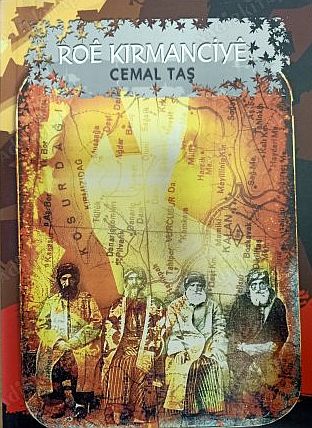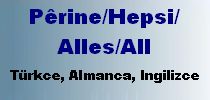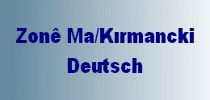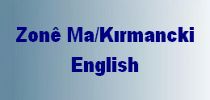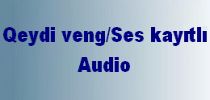Info:
En - The dictionary is also context-based and is constantly updated.
Zonê Ma/Kırmancki is not kurdish or zazaish/zazaki! (political classification, it was misrepresented in political and nationalist circles).
It is an endangered language (vulnerable). In terms of identity name, the political and nationalist Zazas claim in the Dersim (or Dêsim) University, Wikipedia, in the linguistic classification designation as well as in their own organization founded Zaza-Der
Societies, Zonê Ma/Kırmancki is Zazaki and their speaker Zazas. It is, however, a identiy-designation , dialect- and standard language-fictions, circulated for its own benefit,
as well as factually unsubstantiated allegations. This hypothesis is not based on history- and languageresearch based on a pluralistic understanding, nor on a historical process based on the past under the names
Zaza/Zazaki. Nor is it based on an identity and language designation that emerged through a historical process based on a common "National Building". The new written language is still in a state of development
with different language and identity names in the pre-nation stage. At this stage, the development of language, and then the historical linguistic development process is important and to take into account.
The same attitude also takes place on the part of the kurdish nationalists, who claim that Zonê Ma/Kırmancki is kurdish and their dialect.
In both cases they are politically and nationalistically motivated false and untrue statements.
There are no texts from Kurdish and Kırmancki (Zazaki, Dimilki) before the 16th century. Current evaluations are based on the last 500 years. In order to assess the kinship, it is essential to be able to speak the
following languages: Modern Iranian languages, Middle Persian, Parthian. Standardization is a lengthy process and can take a long time. The ethnicity depends not only on the language, but also culture,
religion, common History, origin, social behavior, social factors, etc. are also important factors.
Distribution area of Zonê Ma/Kırmancki Language (East-Turkey):
Dersim (or "Dêsım"); Erzincan: Tercan, Çayırlı; Sivas: Zara, Imranli, Kangal, Divriği; Mus: Varto; Erzurum: Hınıs, Tekman, Pasinler, Senkaya, Aşkale, Çat; Bingöl: Kıgı, Karlıova; Elazıg: Centre, Karakocan;
and other (metropolitan and towns). Also in Diaspora: Austria, France, Germany, Netherlands, Switzerland, United Kingdom and other.
D - Das Wörterbuch ist zusätzlich kontextbasiert und wird ständig aktualisiert.
Zonê Ma/Kırmancki ist nicht kurdisch oder Zaza/Zazaki! (falsche Darstellung von politischen und nationalistischen Kreisen).
Es ist eine vom Aussterben bedrohte Sprache (potentiell gefährdet). In Bezug auf die Identitätsbezeichnung behaupten politische und nationalistische Zazas in der Dersim (oder Dêsim) Universität, Wikipedia, in der sprachlichen Klassifikationsbezeichnung sowie in eigener
Organization gegründeten Zaza-Der Vereinen Zonê Ma/Kırmancki wäre Zazaki und deren Sprecher seien Zazas. Es ist aber eine zwecks eigenem Vorteil in
Umlauf gebrachte Identitätsbezeichnung, Dialekterei und Standardsprache-Fiktionen sowie nicht belegte Behauptungen. Diese Hypothese basiert weder auf einer auf pluralistischem Verständnis beruhenden
Geschichts- und Sprachforschung, noch auf einem in der Vergangenheit beruhenden historischen Prozess unter den Bezeichnungen Zaza/Zazaki. Es basiert auch nicht auf eine Identitäts- und Sprachbezeichnung,
die durch einen geschichtlichen historischen Prozess aufrund einer gemeinsamen "National Buildung" entstanden ist. Die neue Schriftsprache ist - mit unterschiedlichen Sprach- und Identitätsbezeichnungen im
Vor-Nation-Stadium - noch in einem Entwicklungszustand. In diesem Stadium ist die Entwicklung der Sprache, und danach auch der historische sprachliche Entwicklungsprozess wichtig und mitzuberücksichtigen.
Die selbe Einstellung findet auch seitens der kurdischen Nationalisten statt, diese behaupten Zonê Ma/Kırmancki wäre kurdisch und deren Dialekt.
In beiden Fällen handelt es sich um politisch und nationalistisch motivierte falsche und unwahre Behauptungen.
Es gibt keine Texte von Kurdisch und Kırmancki (Zazaki, Dimilki) vor dem 16. Jahrhundert. Die heutigen aktuellen Bewertungen basieren auf den letzten 500 Jahren. Zur Beurteilung der Verwandtschaft muss man
unbedingt folgende Sprachen können: Heutige iranische Sprachen, Mittelpersisch, Parthisch. Die Standardisierung ist ein langwieriger Prozess und kann sehr lange dauern. Außerdem richtet sich die
ethnische Zugehörigkeit nicht nur nach der Sprache, sondern auch Kultur, Religion, gemeinsame Geschichte, Herkunft, soziales Verhalten, soziale Faktoren, etc. sind auch wichtige Faktoren.
Verbreitungsgebiet der Zonê Ma/Kırmancki Sprache (Ost-Türkei):
Dersim (oder Dêsım); Erzincan: Tercan, Çayırlı; Sivas: Zara, Imranli, Kangal, Divriği; Muş: Varto; Erzurum: Hınıns, Tekman, Pasinler, Senkaya, Aşkale, Çat; Bingöl: Kıgı, Karlıova; Elazığ: Zentrum, Karakocan; und andere (Metropolen und Städthe). Außerdem in der Diaspora: Australien, Frankreich, Deutschland, Niederlande, Schweiz, England und andere.
Tr - Sözlük ayrıca bir sözcüğün belirli bir bağlamda (cümle ilişkisi) nasıl kullanıldığınıda gösterir ve sürekli güncellenir.
Zonê Ma/Kırmancki kürtçe veya zaza/zazaki değildir! (siyasi ve milliyetci çevrelerin yanıltıcı yanlış bilgileridir).
Tehlike altında olan bir dildir (kırılgan). Kimlik tanımı konusunda Zaza milliyetcileri tarafından kendi çıkarı adına Dersim (veya Dêsim) Üniversitesi, Wikipedia, Dil klasifikasyonundaki isimlendirmede ve
kendi organizelerine ait Zaza-Der'ler ile bilgi kirliliği ve dayanaksız lehçe ve standard dil hipotezleri yapıyorlar. Bu hipotez çoğulcu anlayışa dayanan tarih ve dil araştırmalarına dayanmıyor, dilin Zazaki kavramı
altında geçmişe dayalı tarihsel bir sürece dayanmıyor, “Zaza/Zazaki” kavramları altında “Nation Building (kimlik-aidiyet inşaası)” gibi bir süreçden, yani tüm kesimden herhangi bir ulusal mücadeleden oluşan bir
olgudan kaynaklanmıyor, yeni yazı ise - çeşitli dil ve kimlik tanımımızın olduğu ulus-öncesi bir süreçte - daha gelişmekte olan bir süreçtedir, burada dilin gelişimi ve dilin tarihsel süreçleride önemlidir ve dikkate
alınmalıdır.
Aynı yaklaşım kürt milliyetcilerinde de var, onlarda Zonê Ma/Kırmancki'nin kürtçe lehçesi olduğunu iddia ediyorlar.
Her ikiside milliyetci ve siyasi motivasyon ile öne sürülen yanlış bilgilerdir.
16. yüzyıldan önce Kürtçe ve Kırmancki'den (Zazaki, Dimilki) hiç bir metin yok. Şimdiki değerlendirmeler son 500 yıla dayalı değerlendirmelerdir. Akrabalığı değerlendirmek için şu dilleri bilmek çok önemlidir: Modern
İran dilleri, Orta Farsça, Partça. Standardizasyon ise uzun vaadeli bir prozedur ile gelişir. Ayrıca etnik köken yalnızca dile yönlenme ile değil, aynı zamanda kültür, din, ortak tarih, köken, sosyal davranış,
sosyal faktörler de önemli faktörlerdir.
Zonê Ma/Kırmancki’nin yayılma alanı (Doğu Türkiye):
Dersim (veya “Dêsım”); Erzincan: Tercan, Çayırlı; Sivas: Zara, Imranli, Kangal, Divriği; Muş: Varto; Erzurum: Hınıs, Tekman, Pasinler, Senkaya, Aşkale, Çat; Bingöl: Kıgı, Karlıova; Elazığ: Merkez, Karakocan; ve başka (Metropoller ve Şehirler). Ayrıca Diasporada: Avustralya, Fransa, Almanya, Hollanda, İsviçre, İngiltere ve başka.
|
|
